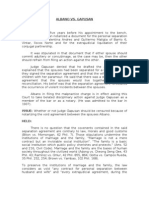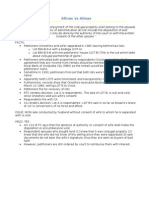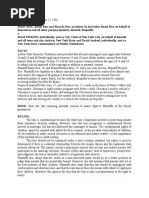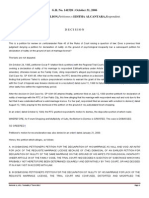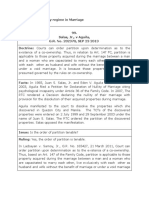824 Digest
824 Digest
Uploaded by
raisahelgaCopyright:
Available Formats
824 Digest
824 Digest
Uploaded by
raisahelgaCopyright
Available Formats
Share this document
Did you find this document useful?
Is this content inappropriate?
Copyright:
Available Formats
824 Digest
824 Digest
Uploaded by
raisahelgaCopyright:
Available Formats
Roberto Laperal Jr. et.al vs. Ramon Katigbak, et.al. Facts: 1.
The Laperals instituted a complaint against Katigbak and Kalaw seeking the recovery of P14000 evidenced by various promissory notes and for the return of jewelry delivered to Katigbak for sale on commission. 2. Upon confession of judgment by Katigbak, the court rendered judgment against him to pay the Laperals the said sum and return of jewelry. 3. About a month after the decision was rendered, Kalaw filed a complaint against her husband Katigbak for judicial separation of property and separate administration 4. Court granted the said complaint.
2. Deed to the disputed land is in the name
of the wife.
3. At the time of its purchase, the property
was already of such substantial value as admittedly, the husband, by himself could not have afforded to buy, considering that singular source of income then was his P200.00 a month salary from a Manila Bank. Mariano Veloso vs. Lucia Martinez, personally and as administratrix of the estate of Domingo Franco Facts:
1. Plaintiff commenced an action to recover
of the defendant the possession of a certain parcel of land together with the sum of P125 per month.
2. Defendant answered and filed a
counterclaim for services rendered by the deceased to the plaintiff and recovery of certain jewelry alleged to be in the possession in the plaintiff.
5. Laperals filed another complaint against
Kalaw and Katigbak seeking the annulment of the proceedings for the above complaint, to enforce judgment secured by the Laperals on the fruits of Kalaws paraphernal property and to secure a ruling declaring the real property as conjugal property of Katigbak and Kalaw.
3. The jewels in question before the
possession of the same was given to the plaintiff, belonged to the defendant personally and that she had inherited the same from her mother.
6. Court dismissed the complaint and
rendered the property as paraphernal. a. Ramon and Evelina got married in 1938. b. The subject property was registered in the name of Evelina Katigbak married to Ramon Katigbak on December6, 1939 only two years after the marriage. c. Evelina declares that her mother Pua was the one that had bought the property for her Issue: Whether or not the property is conjugal Held: NO Indeed, all properties acquired during the marriage are, by law, presumed conjugal. The presumption however is not conclusive but merely rebuttable. This is a case where the presumption has been sufficiently and convincingly proven.
4. Defendant Lucia is the widow of Domingo
Franco and after the death of her husband she was appointed as the adminsitratrix.
5. A short time before the death of Domingo
he borrowed from plaintiff money and gave as security the jewelry. Issue: whether or not jewelry is conjugal property Held: NO
6. It was contended that the jewelry was
never delivered to Plaintiff. It was shown that the key to the box where the jewelry was kept remained with the deceased.
7. Defendant now denies that she knew that
her husband had pawned her jewels or that she promised to redeem the same by paying the amount due.
8. Record shows that the jewels were the
sole and separate property of the wife acquired from her mother. It is part of her paraphernal property. As such she exercised dominion over the same.
1. The land in question was purchased for
the wife with her own separate funds. Other than invoking the presumption, the burden of denying the evidence so presented was shifted to the appellant.
9. She had the exclusive control and
management of the same, until and unless she had delivered it to her husband, before a notary public, with the intent that
the husband might administer it properly. (Article 1384, Civil Code.) There is no proof in the record that she had ever delivered the same to her husband, in any manner, or for any purpose. Amalia Plata vs. Hon. Nicasio Yatco, Sheriff Machoron and Spouses Cesarea Villanueva and Gregorio Leano Facts: 1. Plata purchased a land in 1954. 2. She sold the land to Saldana. 3. Seven months afterwards, September 24, 1958, Saldana resold the same property to Plata married to Gaudencio Begosa.
the land into conjugal property, considering that it was paraphernal in origin. This is particularly the case where the addition of Begosa as co-mortgagor was clearly an afterthought, the text of the deed showing that Plata was the sole mortgagor. The illegal detainer judgment against the husband alone cannot bind nor affect the wife's possession of her paraphernal, which by law she holds and administers independently, and which she may even encumber or alienate without his knowledge or consent (Civ. Code, Arts. 136. 137, 140). Hence, as she was not made party defendant in the eviction suit, the petitioner-wife could validly ignore the judgment of eviction against her husband, and it was no contempt of court for her to do so, because the writ of execution was not lawful against her . Luis Lim, administrator vs. Isabel Garcia, widow of Hilario Lim Facts: 1. Hilario died interstate some time in 1903, leaving widow and nine children.
4. On the same date, Amalia Plata in
consideration of a loan mortgaged to Villanueva the identical property and its improvements of which the mortgagor declares to be hers as the absolute owner thereof. The mortgage was also signed by Gaudencio as co-mortgagor. 5. Plata defaulted. The property was foreclosed, Villanueva was the highest bidder. 6. Respondent sued Gaudencio alone for illegal detainer and an order was obtained against him. 7. A writ of execution was issued but Plata resisted all efforts to eject her from the property Issue: WoN Plata is bound by the detainer judgment against Gaudencio Begosa Held: NO The well known presumption that persons openly living together as husband and wife are legally married to each other, and that the prior marriage of Begosa to someone else does not necessarily exclude the possibility of a valid subsequent marriage to herein petitioner; still the respondents Villanueva could not ignore the paraphernal character of the property in question, which had been unquestionably acquired by Plata while still single, as shown by Transfer Certificate of Title No. 25855 of Rizal The subsequent conveyance thereof to Celso Saldaa, and the reconveyance of her several months afterward of the same property, did not transform it from paraphernal to conjugal property, there being no proof that the money paid to Saldaa came from common or conjugal funds It is true that Gaudencio Begosa signed the mortgage as a co-mortgagor; but by itself alone that circumstance would not suffice to convert
2. The trial court was of opinion that the
entire estate was a conjugal property except a house and lot and the sum of 10k which had been brought to the marriage and which was sold in the course of the administration of his estate together with the improvements 3. Petitioner for the surviving children contends that none of these properties are conjugal, because they alleged that Isabel brought nothing to the marriage. Issue: WoN the property is conjugal Held: NO These parcels of land were not acquired by the appellee by conveyance from her husband, and that they were in fact conveyed to her by third parties by way of exchange for certain property inherited by her from her father's estate during the coverture, and they are, therefore, her separate property under the provisions of paragraph 3 of article 1396, which provides that property acquired by exchange for other property belonging separately to one of the married couple is the separate property of the owner of the property for which it is exchanged. Ma. Darlene Dimayuga-Laurena vs.CA and Jesse Lauro Laurena Facts: 1. Darlene and Jesse were married on 19 December 1983. They have two children Mark and Michael.
2. On October 1993, petitioner filed a
petition for declaration of nullity of marriage against respondent alleging psychological incapacity. 3. Petitioner alleged that respondents psychological incapacity was manifested by his infidelity, utter neglect of his familys needs, irresponsibility, insensitivity, and tendency to lead a bachelors life. 4. Petitioner further alleged that during their marriage, she and respondent acquired properties which were all part of their conjugal partnership of gains. Petitioner prayed for the dissolution of the CPG, custody of their children and monthly support. a. duplex house and lot located at 4402 Dayap Street, Palanan, Makati City; house and lot on Palaspas Street, Tanauan, Batangas;
The loan proceeds were used as additional capital for the Jeddah Caltex Station. The Lease Contract26 on the Jeddah Caltex Station was signed by respondent as attorney-in-fact of his mother Juanita Laurena, leaving no doubt that it was the business of respondents parents. Jeddah Trucking was established from the proceeds and income of the Jeddah Caltex Station. Respondent testified that he received a series of promotions during their marriage "until we can afford to buy that duplex [on] Dayap."28 Hence, the duplex house on Dayap Street, Makati City should be included in the conjugal partnership of gains. Ramon C. Ong vs. Court of Appeals Facts: 1. Teodora conducted her own logging business. In furtherance of her business operation, she secured from Boix a loan. 2. Teodora defaulted. Hence Boix filed a case against her. 3. Judgment was rendered in favor of Boix and thus the Sheriff levied and attached a parcel of land. 4. Said parcel of land was awarded in favor of Boix pursuant to a writ of execution. 5. Ramon filed a complaint to annul the auction sale of a parcel of land, allegedly owned conjugally by him and his former wife Teodora and thus could not be held liable for personal debts contracted by the wife. Issue: WoN the subject property is conjugal Held: NO Petitioner relied heavily on the fact that since the surname Ong was carried by Teodora in the Tax Declaration of the subject property, it indicates that the subject property was acquired during the marriage and therefore conjugal. The mere use of the surname of the husband in the tax declaration of the subject property is not sufficient proof that said property was acquired during the marriage and is therefore conjugal. It is undisputed that the subject parcel was declared solely in the wife's name, but the house built thereon was declared in the name of the spouses. Alejandra Palanca vs. Smith Bell and Co. and Emilio Boncan Facts: 1. Smith Bell and Co. obtained judgment against Boncan for a sum of money
b.
c. dealership of Jeddah Caltex Service Station in Pres. Laurel Highway, Tanauan, Batangas (Jeddah Caltex Station); d. Personal vehicles consisting of a Mitsubishi Lancer, Safari pick-up, L300 van and L-200 pick-up; and e. Jeddah Trucking. 5. Respondent denied petitioners allegations. 6. RTC and CA denied petitioners petition for declaration of nullity however it granted the dissolution of the CPG Issue: WoN the properties are part of CPG Held: Properties of Respondents parents do not form part of CPG. The ancestral house and lot in Tanauan, Batangas; the duplex house and lot on Dayap Street, Makati City; and the properties acquired through the operations of the Jeddah Caltex Station and Jeddah Trucking. As early as 15 July 1978, respondents parents already executed a General Power of Attorney23 in favor of respondent covering all their properties and businesses. Several Special Powers of Attorney were also executed by respondents parents in favor of respondent. On 14 April 1987, respondents parents executed a Deed of Absolute Sale24 covering two parcels of land located in Tanauan, Batangas the transfer was merely an accommodation so that petitioner, who was then working at the Bangko Sentral ng Pilipinas (BSP), could acquire a loan from BSP at a lower rate25 using the properties as collateral.
2. Later it obtained an execution which was
levied upon the property in question, house constructed using the money borrowed by husband.
3. After the said execution was levied upon
the property, Boncan filed an action
against Smith asking the court to declare her to be the exclusive owner of the house with the right to the possession and the said attachment be dissolved. Issue: WoN the property in question is an exclusive property of Alejandra thus not subject to the execution Held: NO Alejandra was the owner of a certain property. Such property was given by Emilio with the consent of Alejandra as a guaranty for the payment of a loan against International Banking Corporation With the money borrowed, Emilio constructed a house in question and later conveyed the house to Alejandra and as guaranty for the payment of the debt to the International Banking. The money borrowed by Emilio upon the credit of the property of his wife became conjugal property and when the same was reinvested in the construction of a house, the house became conjugal property. Spouses Ricky Wong vs. IAC FACTS: 1. Romario Henson married Katrina on January 1964. They had 3 children however, even during the early years of their marriage, the spouses had been most of the time living separately. 2. During the marriage or on about January 1971, the husband bought a parcel of land in Angeles from his father using the money borrowed from an officemate. 3. Sometime in June 1972, Katrina entered an agreement with Anita Chan where the latter consigned the former pieces of jewelry valued at P321,830.95. 4. Katrina failed to return the same within the 20 day period thus Anita demanded payment of their value. Katrina issued in September 1972, check of P55,000 which was dishonored due to lack of funds. 5. The spouses Anita Chan and Ricky Wong filed action for collection of the sum of money against Katrina and her husband Romarico. The reply with counterclaim filed was only in behalf of Katrina. 6. Trial court ruled in favor of the Wongs then a writ of execution was thereafter issued upon the 4 lots in Angeles City all in the name of Romarico Henson married to Katrina Henson. 2 of the lots were sold at
public auction to Juanito Santos and the other two with Leonardo Joson. A month before such redemption, Romarico filed an action for annulment of the decision including the writ and levy of execution. ISSUE: WON debt of the wife without the knowledge of the husband can be satisfied through the conjugal property. HELD: NO The spouses had in fact been separated when the wife entered into the business deal with Anita. The husband had nothing to do with the business transactions of Katrina nor authorized her to enter into such. The properties in Angeles were acquired during the marriage with unclear proof where the husband obtained the money to repay the loan. Hence, it is presumed to belong in the conjugal partnership in the absence of proof that they are exclusive property of the husband and even though they had been living separately. A wife may bind the conjugal partnership only when she purchases things necessary for support of the family. The writ of execution cannot be issued against Romarico and the execution of judgments extends only over properties belonging to the judgment debtor. The conjugal properties cannot answer for Katrinas obligations as she exclusively incurred the latter without the consent of her husband nor they did redound to the benefit of the family. There was also no evidence submitted that the administration of the partnership had been transferred to Katrina by Romarico before said obligations were incurred. In as much as the decision was void only in so far as Romarico and the conjugal properties concerned, Spouses Wong may still execute the debt against Katrina, personally and exclusively. Clara Torela and Silveriana Torela vs. Felimon Torela et.al. Facts: 1. Felimon married to Graciana is the owner of a certain parcel of land.
2. On March 5, 1958, Felimon filed a Motion
Ex-parte praying that the court order the Register of deeds to change his civil status
from Felimon married to Graciana to Felimon married Marciana 3. Finding no opposition thereto with the conformity of Clara daughter of Felimon and Graciana, granted the motion. 4. Felimon executed a deed of sale whereby he sold a lot to Mahilum. He stated in the said deed of sale that he was a widower by first marriage and now married to Marciana and that he is a registered owner. 5. Petitioner now wants to declare the said land in question as conjugal property thus they are entitled to the share of the said land as compulsory heirs Issue: WoN the parcel of land is a conjugal property of Feliciano and their deceased mother Held: NO Felimon and Graciana were married in 1915. The land in question was decreed in the name of Felimon married to Graciana. According to Art. 1401 of the Civil Code the ff properties belong to the conjugal partnership: 1. Acquired for a valuable expense of a common fund 2. Obtained by industry, wages or work of the spouses or either 3. Fruit, income or interest collected or accrued during the marriage derived from the partnership property or which belongs separately to either of the spouse Felimon contested that he inherited it from his property. As a matter of fact at the time of his marriage with his first wife, Graciana Gallego, a portion of said land had already been cultivated by him. Asked what was the condition of the land in 1915 (the date of his first marriage), he answered: "Only a portion of the lot was plowed by me." (t.s.n., p. 18.) As it was inherited by Felimon from his parents and brought to the marriage with his first wife, the same is deemed his separate property (Art, 1396, Old Civil Code). For these reasons, defendant Felimon Torela had lawfully disposed of his property to the exclusion of his children by his first marriage. Court of Appeals failed to take into account Article 1407 of the Spanish Civil Code, which now correspond to Article 160 of the New Civil Code, and which reads as follows: Art. 1407, All property of the spouses shall be deemed partnership property in the
absence of proof that it belongs exclusively to the husband or to the wife. While it is true that all property of the marriage is presumed to be conjugal, as above stated, nonetheless the party who invokes the presumption must first prove that the property was acquired during the marriage. This proof is a conditionsine qua non for the application of the presumption. In the instant case there is nothing in the record to show that the lot in question was acquired during the marriage of Felimon Torela and Graciana Gallego. In fact, one of the petitioners herein, Clara Torela, gave her conformity to her father's Ex-Parte Motion of March 5, 1958, wherein it was recited, inter alia, that Felimon Torela had acquired the property by way of inheritance prior to his marriage to his first wife, Graciana Gallego. Epifania Magallon vs. Hon. Rosalina Montejo, Concepcion Lacerna et.al Facts:
1. Respondents instituted a case against
Martin Lacerna to compel partition of a parcel of land to which Martin had perfected a claim by homestead. 2. Respondents claiming to the common children of Martin and his wife, Eustaqia, who died in 1953, asserted a right to of the land as their mothers share in her conjugal partnership with Martin. 3. Defendant denied marriage to Eustaqia although he admitted living with her without benefit of marriage. 4. Trial Court found that Martin was indeed married to Eustaqia and the respondents were their children.
5. The Trial Court further found that Martin
had begun working the homestead, and his right to a patent to the land accrued, during his coverture with Eustaquia. On the basis of these findings, the plaintiffs were declared entitled to the half of the land claimed by them.
6. It appears that at the time the case was
brought no certificate of title has been issued to Martin although he had complied with the requirements necessary to the grant.
7. The OCT was only issued while Lacernas
appeal was pending in the IAC. It states on its face that it is issued in the name of " ... MARTIN LACERNA, Filipino, of legal
age, married to Epifania Magallon ... ," the latter being the present petitioner.
3. In 1976, spouses separated de facto and no longer communicated with each other. 4. In March 1995, Manuel discovered that Martha had previously sold the property to Titan through a deed of sale. 5. Manuel filed a complaint for annulment of contract and reconveyance against Titan. He alleged that the sale executed b y Martha in favor of titan was without his knowledge and consent and therefore void. 6. Titan claimed that it was a buyer in good faith and for value because it relied on the SPA signed by Manuel which authorized Martha to dispose of the property on behalf of the spouses.
8. IAC ruled in favor of respondents thus a
writ of execution was issued. Issue: WoN the property is owned by Martin and Petitioner? Held: NO The land in question, which rightfully pertained to the conjugal partnership of Martin Lacerna and Eustaquia Pichan, the plaintiff's mother, and should have been titled in the names of said spouses, was, through fraud or mistaken, registered in the names of Martin Lacerna and petitioner herein, Epifania Magallon In such a situation, the property should be regarded as impressed with an implied, or a constructive, trust for the party rightfully entitled thereto. the petitioner herein, as the trustee of a constructive trust, has an obligation to convey to the private respondents that part of the land in question to which she now claims an ostensible title, said portion rightfully pertaining to the respondents' deceased mother as her share in the conjugal partnership with Martin Lacerna. The phrase "married to Epifania Magallon written after the name of Martin Lacerna in said certificate of title is merely descriptive of the civil status of Martin Lacerna, the registered owner, and does not necessarily prove that the land is "conjugal" property of Lacerna and petitioner Neither can petitioner invoke the presumption established in Article 160 of the Civil Code that property acquired during the marriage belongs to the conjugal partnership, there being no proof of her alleged marriage to Martin Lacerna except that which arises by implication from the aforestated entry in the certificate of title and for the far more compelling reason that the homestead claim on the land was shown to have been perfected during Martin Lacerna's marriage to Eustaquia Pichan, mother of the private respondents.
7. Manuel claimed that the SPA was spurious
and the signature purporting to be his was a forgery. Hence Martha has no authority to sell it. Issue: WoN the property is conjugal thus Martha doesnt have the authority to sell it without the consent of Manuel Held: YES The property is part of the spouses conjugal partnership. Article 160. All property of the marriage is presumed to belong to the conjugal partnership, unless it be proved that it pertains exclusively to the husband or to the wife. Manuel was not required to prove that the property was acquired with funds of the partnership. Rather, the presumption applies even when the manner in which the property was acquired does not appear.23 Here, we find that Titan failed to overturn the presumption that the property, purchased during the spouses marriage, was part of the conjugal partnership. In the absence of Manuels consent, the Deed of Sale is void. Since the property was undoubtedly part of the conjugal partnership, the sale to Titan required the consent of both spouses. Article 165 of the Civil Code expressly provides that "the husband is the administrator of the conjugal partnership". Likewise, Article 172 of the Civil Code ordains that "(t)he wife cannot bind the conjugal partnership without the husbands consent, except in cases provided by law". Similarly, Article 124 of the Family Code requires that any disposition or encumbrance of conjugal property must
Titan Construction Corporation vs. Manuel David and Martha David Facts: 1. Manuel and Martha were married in March 25, 1957. 2. In 1970, spouses acquired a lot located at White Plains which was registered in the name of Martha David married to Manuel David.
have the written consent of the other spouse, otherwise, such disposition is void. The Special Power of Attorney purportedly signed by Manuel is spurious and void. Titan is not a buyer in good faith. Because at the face of the TCT it can be inferred that the said property is owned by Martha married to Manuel, thus it may deemed to be a conjugal property. Evangeline Imani vs Metrobank Facts:
To support her assertion that the property belongs to the conjugal partnership, petitioner submitted the Affidavit35 of Crisanto Origen, attesting that petitioner and her husband were the vendees of the subject property, and the photocopies of the checks36 allegedly issued by Sina Imani as payment for the subject property. Unfortunately for petitioner, the said Affidavit can hardly be considered sufficient evidence to prove her claim that the property is conjugal. As correctly pointed out by Metrobank, the said Affidavit has no evidentiary weight because Crisanto Origen was not presented in the RTC to affirm the veracity of his Affidavit The fact that the land was registered in the name of Evangelina Dazo-Imani married to Sina Imani is no proof that the property was acquired during the spouses coverture. Acquisition of title and registration thereof are two different acts. It is well settled that registration does not confer title but merely confirms one already existing. Indubitably, petitioner utterly failed to substantiate her claim that the property belongs to the conjugal partnership. Thus, it cannot be rightfully said that the CA reversed the RTC ruling without valid basis. Thomas Cheesman vs IAC and Estelita Padilla Facts:
1. Envangeline signed a continuing
suretyship agreement in favor of Metrobank with Cesar Dazo et. al as her co-sureties.
2. As sureties, they bound themselves to pay
Metrobank whatever indebtedness CP Dazo Tannery Inc. (CPDTI)
3. CPDTI defaulted in the payment of its
loans.
4. Metrobank filed a collection suit against
CPDTI and its sureties, including herein petitioner.
5. Trial court ruled in favor of Metrobank. It
also issued a writ of execution.
6. The sheriff levied on a property registered
in the name of Petitioner. Public auction was executed and the property was awarded to Metrobank.
1. Cheesman files to the court for the
annulment for lack of his consent the sale by his wife Criselda of a residential lot and building to Estelita.
7. Metrobank filed a manifestation and
motion praying that spouses Imani be directed to surrender the owners copy of TCT for cancellation.
2. Thomas and Criselda were married on
December 4, 1970 but have been separated since February 15, 1981.
8. Petitioner opposed and filed a comment
with urgent motion to cancel and nullify the levy on execution, the auction sale and certificate of salve over TCT. She argued that the subject property belongs to the conjugal partnership as such it cannot be held answerable for the liabilities incurred by CPDTI to Metrobank. Issue: WoN the property is conjugal Held: NO Indeed, all property of the marriage is presumed to be conjugal. However, for this presumption to apply, the party who invokes it must first prove that the property was acquired during the marriage. Proof of acquisition during the coverture is a condition sine qua non to the operation of the presumption in favor of the conjugal partnership.31 Thus, the time when the property was acquired is material.
3. On June 4, 1974, a deed of sale and
transfer was executed by Armando conveying a parcel of unregistered land and house in favor of Criselda married to Thomas. Thomas although aware of the deed did not object to the transfer being made only to his wife.
4. Thereafter, with knowledge and without
protest of Thomas, tax declarations for the property was issued in the name only of Criselda and she assumed exclusive management and administration of the property.
5. The action instituted by Thomas resulted
in a judgment declaring void ab nitio the sale executed by Criselda in favor of Estelita.
6. Judgment was however set aside as
regards Estelita on a petition for relief
grounds on FAMEN which had seriously impaired her right. Issue: WoN the property is conjugal Held: NO assuming that it was his intention that the lot in question be purchased by him and his wife, he acquired no right whatever over the property by virtue of that purchase; and in attempting to acquire a right or interest in land, vicariously and clandestinely, he knowingly violated the Constitution; the sale as to him was null and void. he had and has no capacity or personality to question the subsequent sale of the same property by his wife on the theory that in so doing he is merely exercising the prerogative of a husband in respect of conjugal property. (1) that the property in question was bought during the existence of the marriage between the plaintiff and the defendant Criselda P. Cheesman; (2) that the property bought during the marriage was registered in the name of Criselda Cheesman and that the Deed of Sale and Transfer of Possessory Rights executed by the former ownervendor Armando Altares in favor of Criselda Cheesman made no mention of the plaintiff; the exercise by Criselda of exclusive acts of dominion with the knowledge of her husband "had led . . . Estelita Padilla to believe that the properties were the exclusive properties of Criselda Cheesman and on the faith of such a belief she bought the properties from her and for value," and therefore, Thomas Cheesman was, under Article 1473 of the Civil Code, estopped to impugn the transfer to Estelita Padilla. Funds used by Criselda Cheesman was money she had earned and saved prior to her marriage to Thomas Cheesman,His wife had used her own money to purchase the property cannot, and will not, at this stage of the proceedings be reviewed and overturned. But even if it were a fact that said wife had used conjugal funds to make the acquisition, the considerations just set out militate, on high constitutional grounds, against his recovering and holding the property so acquired or any part thereof. Estelita Padilla is a purchaser in good faith, both the Trial Court and the Appellate Court having found that Cheesman's own conduct had led her to believe the property to be exclusive property of the latter's wife, freely disposable by her without his consent or intervention. An innocent buyer for value, she is entitled to the protection of the law in her purchase, particularly as against Cheesman, who would assert rights to the property denied him by both letter and spirit of the Constitution itself.
Procopio Villanueva, Nicolas Retuya et.al vs. CA and Heirs of Eusebia Retuya Facts:
1. Eusebia is the legal wife of Nicolas having
been married to the latter on October 7, 1926.
2. Out of the said marriage they begot 5
children. During their marriage they acquired real properties and all improvements.
3. Nicolas is also a co-owner of a parcel of
land which he inherited from his parents as well as the purchasers of hereditary shares.
4. In 1945, Nicolas no longer lived with his
family and cohabited with Pacita wherein Procopio is their illegitimate son.
5. Nicolas then was the only person who
received the income of the properties. Pacita from the time she lived in concubinage with Nicolas, has no occupation and had no properties of her own.
6. Nicolas suffered stroke and cannot talk
and walk anymore.
7. Natividad knew of Nicolas physical
condition visited him at the hospital. From the time Nicolas suffered stroke until the present, Procopio, the illegitimate son was the one who receives the income from the said properties.
8. Natividad went to Procopio to discuss
about the properties. And the latter replied that it is not yet time to talk about the said matter.
9. Eusebia filed a complaint against her
husband Nicolas, Pacita and Procopio. She sought the reconveyance from Nicolas and Pacita several properties claiming that said properties are conjugal properties with Nicolas.
10. Eusebia died in 1996.
Issue: WoN the subject properties are conjugal Held: YES Petitioners claim that the subject properties[16] are exclusive properties of Nicolas except for Lot No. 152, which they claim is Pacitas exclusive property. The Family Code provisions on conjugal partnerships govern the property relations
between Nicolas and Eusebia even if they were married before the effectivity of Family Code.[17] Article 105[18] of the Family Code explicitly mandates that the Family Code shall apply to conjugal partnerships established before the Family Code without prejudice to vested rights already acquired under the Civil Code or other laws. Thus, under the Family Code, if the properties are acquired during the marriage, the presumption is that they are conjugal. The burden of proof is on the party claiming that they are not conjugal.[20] This is counter-balanced by the requirement that the properties must first be proven to have been acquired during the marriage before they are presumed conjugal.
[26]
Petitioners failed to meet this standard.
2. Since the subject properties, including Lot
No. 152, were acquired during the marriage of Nicolas and Eusebia, the presumption under Article 116 of the Family Code is that all these are conjugal properties of Nicolas and Eusebia. The burden is on petitioners to prove that the subject properties are not conjugal. The presumption in Article 116, which subsists unless the contrary is proved, stands as an obstacle to any claim the petitioners may have. The burden of proving that a property is exclusive property of a spouse rests on the party asserting it and the evidence required must be clear and convincing.[26] Petitioners failed to meet this standard.
1. subject properties were in fact acquired
during the marriage of Nicolas and Eusebia. The tax declarations[23] covering the subject properties, along with the unrebutted testimony of Eusebias witnesses, establish this fact.
3. The cohabitation of a spouse with another
person, even for a long period, does not sever the tie of a subsisting previous marriage.[33]Otherwise, the law would be giving a stamp of approval to an act that is both illegal and immoral. What petitioners fail to grasp is that Nicolas and Pacitas cohabitation cannot work to the detriment of Eusebia, the legal spouse. The marriage of Nicolas and Eusebia continued to exist regardless of the fact that Nicolas was already living with Pacita. Hence, all property acquired from 7 October 1926, the date of Nicolas and Eusebias marriage, until 23 November 1996, the date of Eusebias death, are still presumed conjugal. Petitioners have neither claimed nor proved that any of the subject properties was acquired outside or beyond this period.
a. Moreover, on whether Lot No. 152
is conjugal or not, the answer came from petitioners themselves. Nicolas and Eusebia were married on 7 October 1926. Nicolas and Pacita started cohabiting in 1936. Eusebia died on 23 November 1996. Pacita and Nicolas were married on 16 December 1996. Petitioners themselves admit that Lot No. 152 was purchased on 4 October 1957.[25] The date of acquisition of Lot No. 152 is clearly during the marriage of Nicolas and Eusebia.
b. Since the subject properties,
including Lot No. 152, were acquired during the marriage of Nicolas and Eusebia, the presumption under Article 116 of the Family Code is that all these are conjugal properties of Nicolas and Eusebia. The burden is on petitioners to prove that the subject properties are not conjugal. The presumption in Article 116, which subsists unless the contrary is proved, stands as an obstacle to any claim the petitioners may have. The burden of proving that a property is exclusive property of a spouse rests on the party asserting it and the evidence required must be clear and convincing.
You might also like
- Sample Format For A Statement of Work (SOW)Document2 pagesSample Format For A Statement of Work (SOW)asreeto100% (1)
- Rethinking Mentoring, - Kimberly GriffinDocument18 pagesRethinking Mentoring, - Kimberly GriffinAdam FontecchioNo ratings yet
- 3 - Katipunan V TenorioDocument1 page3 - Katipunan V TenorioAnonymous lhMSGGZjQNo ratings yet
- Katipunan V TenorioDocument2 pagesKatipunan V Tenorioana ortiz100% (2)
- Greenhouse Niels BohrDocument2 pagesGreenhouse Niels BohrAdolfo Rios Pita Giurfa0% (1)
- Lim V Sta. Crus-LimDocument3 pagesLim V Sta. Crus-LimMonica Salvador100% (1)
- Moe v. DinkinsDocument1 pageMoe v. Dinkinsroberto_rañesesNo ratings yet
- Persons HW # 6Document19 pagesPersons HW # 6Pouǝllǝ ɐlʎssɐNo ratings yet
- Martinez v. Tan, 12 Phil 731Document4 pagesMartinez v. Tan, 12 Phil 731attyreygarinNo ratings yet
- Te Vs Te Case DigestDocument2 pagesTe Vs Te Case DigestRoy BacaniNo ratings yet
- Salientes V AbanillaDocument1 pageSalientes V AbanillaChristian Paul LugoNo ratings yet
- US v. VaquilarDocument1 pageUS v. VaquilarAnonymous NqaBAyNo ratings yet
- Brown v. YambaoDocument2 pagesBrown v. YambaoBenjie CajandigNo ratings yet
- De Jesus V Syquia DigestDocument1 pageDe Jesus V Syquia DigestAJ RamirezNo ratings yet
- Dino Vs DinoDocument1 pageDino Vs DinoSan Vicente Mps IlocossurppoNo ratings yet
- Persons Case Digest CompilationDocument55 pagesPersons Case Digest CompilationRigel VillanuevaNo ratings yet
- Jose Modequillo V BrevaDocument1 pageJose Modequillo V BrevaSam FajardoNo ratings yet
- De Santis V Intestate Estate JalandoniDocument2 pagesDe Santis V Intestate Estate JalandoniAllen Windel BernabeNo ratings yet
- Piccininni Vs Hajus, 180 Conn. 369, 429 A.2d 886 (1980)Document5 pagesPiccininni Vs Hajus, 180 Conn. 369, 429 A.2d 886 (1980)akosiJRNo ratings yet
- MOE vs. DINKIN Case DigestDocument2 pagesMOE vs. DINKIN Case DigestA M I R ANo ratings yet
- Moe Vs DinkinsDocument3 pagesMoe Vs Dinkinsanon_337583363No ratings yet
- GR 158896 Siayngco Vs Siayngco PIDocument1 pageGR 158896 Siayngco Vs Siayngco PIMichael JonesNo ratings yet
- Bier Vs BierDocument1 pageBier Vs BierwesleybooksNo ratings yet
- Albano vs. Gapusan DigestDocument2 pagesAlbano vs. Gapusan Digestproject_ziNo ratings yet
- Garcia Vs SantiagoDocument2 pagesGarcia Vs Santiagoangelica po100% (1)
- Yasin V Sharia Court - DigestDocument2 pagesYasin V Sharia Court - DigestJomz ArvesuNo ratings yet
- Case Digest - Jovellanos v. Court of Appeals, G.R. No. 100728, June 18, 1992Document1 pageCase Digest - Jovellanos v. Court of Appeals, G.R. No. 100728, June 18, 1992Richelle FabellonNo ratings yet
- Lesaca V LesacaDocument1 pageLesaca V LesacaRonwell Lim100% (1)
- Cabreza Vs CabrezaDocument2 pagesCabreza Vs CabrezaRudejane Tan100% (1)
- Alinas Vs AlinasDocument1 pageAlinas Vs AlinasPat GarciaNo ratings yet
- Sss V JarqueDocument2 pagesSss V JarqueMarcus J. ValdezNo ratings yet
- Navarro Vs Cecilio-NavarroDocument2 pagesNavarro Vs Cecilio-NavarroCarlota Nicolas VillaromanNo ratings yet
- Topic: Consent Freely Given Acts: Case Facts Issues RulingDocument1 pageTopic: Consent Freely Given Acts: Case Facts Issues RulingA M I R ANo ratings yet
- Republic Vs TangoDocument8 pagesRepublic Vs TangoJayzell Mae FloresNo ratings yet
- Moe Vs DinkinsDocument1 pageMoe Vs DinkinsJerich HorrillenoNo ratings yet
- Espiritu Vs CADocument1 pageEspiritu Vs CAOppa KyuNo ratings yet
- Domingo V CA - DigestDocument3 pagesDomingo V CA - DigestJomz ArvesuNo ratings yet
- Mallion vs. Alcantara PERSONS CASEDocument4 pagesMallion vs. Alcantara PERSONS CASECoreine Valledor-SarragaNo ratings yet
- Anaya Vs PalaroanDocument2 pagesAnaya Vs PalaroanLouise Bolivar Dadivas100% (1)
- Madridejo v. de LeonDocument4 pagesMadridejo v. de Leondenver41No ratings yet
- TSOI vs. CA, Et Al. G.R. No. 119190 January 16, 1997 FactsDocument48 pagesTSOI vs. CA, Et Al. G.R. No. 119190 January 16, 1997 FactsCaxtiellNo ratings yet
- Jones vs. HortiguelaDocument1 pageJones vs. HortiguelaEdvangelineManaloRodriguezNo ratings yet
- Mendoza V RepublicDocument1 pageMendoza V RepublicRR FNo ratings yet
- 204 Moe v. Dinkins SeneresDocument2 pages204 Moe v. Dinkins SeneresChescaSeñeresNo ratings yet
- 7 Gandionco vs. PenarandaDocument9 pages7 Gandionco vs. PenarandaRaiya AngelaNo ratings yet
- Republic of The Philippines Vs NolascoDocument2 pagesRepublic of The Philippines Vs NolascoAdrian100% (1)
- Republic vs. TampusDocument2 pagesRepublic vs. Tampuslordj zaragozaNo ratings yet
- Republic Vs CatubagDocument2 pagesRepublic Vs CatubagAllen Windel BernabeNo ratings yet
- Property Regime in Marriage Case DigestDocument21 pagesProperty Regime in Marriage Case DigestJeremiah John Soriano NicolasNo ratings yet
- Digest - Wigel Vs Sempio DiyDocument1 pageDigest - Wigel Vs Sempio DiyBEATRIZ FRANCHESKA BURGOSNo ratings yet
- Ayala Investment Corp vs. CADocument2 pagesAyala Investment Corp vs. CAAna RobinNo ratings yet
- Aranes v. Occiano, 380 SCRA 402Document4 pagesAranes v. Occiano, 380 SCRA 402Jose IbarraNo ratings yet
- (Persons) Johnson V CalvertDocument1 page(Persons) Johnson V CalvertPlaneteer PranaNo ratings yet
- Briones v. MiguelDocument3 pagesBriones v. MiguelAMBNo ratings yet
- Valdes v. RTCDocument2 pagesValdes v. RTChannahnueveNo ratings yet
- Supreme Court: Fausto C. Cuizon For Appellant. Attorney-General Jaranilla For AppelleeDocument2 pagesSupreme Court: Fausto C. Cuizon For Appellant. Attorney-General Jaranilla For AppelleeDat Doria PalerNo ratings yet
- Martinez V TanDocument2 pagesMartinez V TanpaobnyNo ratings yet
- Dumlao v. Quality PlasticsDocument1 pageDumlao v. Quality PlasticsMary Louise R. ConcepcionNo ratings yet
- 08 Munoz V RamirezDocument2 pages08 Munoz V Ramirezpdasilva100% (1)
- Roberto Laperal Jr. Et - Al vs. Ramon Katigbak, Et - Al.Document9 pagesRoberto Laperal Jr. Et - Al vs. Ramon Katigbak, Et - Al.Siobhan RobinNo ratings yet
- Trust - Final Case DigestsDocument5 pagesTrust - Final Case DigestsDyan Corpuz-SurescaNo ratings yet
- Wong v. IAC - DigestDocument3 pagesWong v. IAC - DigestNicole OliverosNo ratings yet
- Case Digests 79-88Document15 pagesCase Digests 79-88Ceslhee AngelesNo ratings yet
- IN THE MARGINS BEHIND THE LINES Collected Writings Volume IIDocument3 pagesIN THE MARGINS BEHIND THE LINES Collected Writings Volume IIsiegelsupportNo ratings yet
- Introduction of Bajaj Allianz Life Insurance CompanyDocument24 pagesIntroduction of Bajaj Allianz Life Insurance CompanyKarmesh VarshneyNo ratings yet
- CHAPTER 2 AssignmentDocument5 pagesCHAPTER 2 Assignmenternesto cruzNo ratings yet
- Milktea Case Study: Group 1 Final Round MinicaseDocument24 pagesMilktea Case Study: Group 1 Final Round MinicaseHải ĐăngNo ratings yet
- P2 Holiday Pack 2024 Term 3 (1)Document40 pagesP2 Holiday Pack 2024 Term 3 (1)GLOBAL CAFENo ratings yet
- Lesson 3 Conducting Market Analysis For Franchising SubjectDocument16 pagesLesson 3 Conducting Market Analysis For Franchising SubjectJengky PabuayaNo ratings yet
- Massiah v. United States, 377 U.S. 201 (1964)Document10 pagesMassiah v. United States, 377 U.S. 201 (1964)Scribd Government DocsNo ratings yet
- Chords - Maroon 5 - PayphoneDocument3 pagesChords - Maroon 5 - PayphoneDiaz KusdiastaNo ratings yet
- Overall Analysis of E-Banking and Information Management System of Sonali BankDocument71 pagesOverall Analysis of E-Banking and Information Management System of Sonali BankRola HaddadNo ratings yet
- Engineering Design Science: November 2005Document7 pagesEngineering Design Science: November 2005Alexander CasallasNo ratings yet
- EC8251-Circuit Analysis PDFDocument30 pagesEC8251-Circuit Analysis PDFPalanikumar Pitchaikani0% (1)
- Jrotc Syllabus Sy22-23 2Document5 pagesJrotc Syllabus Sy22-23 2api-201178565No ratings yet
- Sesion 2 - PDFDocument14 pagesSesion 2 - PDFMaeva FigueroaNo ratings yet
- ChronotopeDocument3 pagesChronotopeRobin ScherbatskyNo ratings yet
- C01 Introduction in Computer SecurityDocument53 pagesC01 Introduction in Computer SecurityDanyel OlaruNo ratings yet
- EnglishMelon OET Live PDFDocument9 pagesEnglishMelon OET Live PDFAmbi AmbiNo ratings yet
- Assignment - 1: Information Systems and Digital FirmsDocument12 pagesAssignment - 1: Information Systems and Digital FirmsKartik SinghNo ratings yet
- Prose-Essay - Two Grandmothers and Du-DuhDocument3 pagesProse-Essay - Two Grandmothers and Du-DuhRonaldo Rambarran100% (1)
- 99practice Questions For AMFI Test4Document57 pages99practice Questions For AMFI Test4Ranjana TrivediNo ratings yet
- LoaDocument4 pagesLoaYudistira WardanaNo ratings yet
- The Christmas VillageDocument39 pagesThe Christmas VillageVictoria ButtaroNo ratings yet
- Breast Cancer in Pakistan - Awareness and Early DetectionDocument3 pagesBreast Cancer in Pakistan - Awareness and Early DetectionMurk NiazNo ratings yet
- Self-Care and Well-Being in Mental Health ProfessionalsDocument23 pagesSelf-Care and Well-Being in Mental Health ProfessionalsAndreaNo ratings yet
- Safety InstructorsDocument3 pagesSafety Instructorsmorganmorgani5232No ratings yet
- PG Analogs Oprost Olol Zolamide OnideDocument1 pagePG Analogs Oprost Olol Zolamide OnideimperiouxxNo ratings yet
- Enso 2020Document44 pagesEnso 2020Miguel Segundo OrtinNo ratings yet























